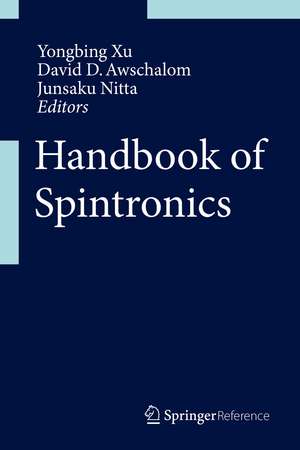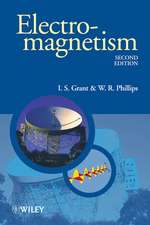Handbook of Spintronics
Editat de Yongbing Xu, David D. Awschalom, Junsaku Nittaen Limba Engleză Hardback – 25 sep 2015
The opening chapters focus on the fundamental physical principles of spintronics in metals and semiconductors, including the theory of giant magnetoresistance and an introduction to spin quantum computing. Materials systems are then considered, with sections on metallic thin films and multilayers, magnetic tunnelling structures, hybrid materials including Heusler compounds, magnetic semiconductors, molecular spintronic materials, carbon nanotubes and graphene. A separate section describesthe various methods used in the characterisation of spintronics materials, including spin-polarised photoemission, x-ray diffraction techniques and spin-polarised SEM.
The third and final part of the Handbook contains chapters on spintronic device technology and applications, including spin valves, GMR and MTJ devices, MRAM technology, spin transistors and spin logic devices, spin torque devices, spin pumping and spin dynamics, and thermal effects in spintronics.
Each chapter builds from the fundamentals through to the state-of-the-art, also considering the challenges faced by researchers and containing some indication of the direction that future work in the field is likely to take. This reference work will be an essential and long-standing resource for the spintronics community, whether in academic or industrial research.
Preț: 3389.46 lei
Preț vechi: 4133.49 lei
-18% Nou
Puncte Express: 5084
Preț estimativ în valută:
648.66€ • 670.10$ • 539.84£
648.66€ • 670.10$ • 539.84£
Carte disponibilă
Livrare economică 04-18 martie
Preluare comenzi: 021 569.72.76
Specificații
ISBN-13: 9789400768918
ISBN-10: 9400768915
Pagini: 1500
Ilustrații: XXIV, 1609 p. 807 illus., 598 illus. in color. In 2 volumes, not available separately.
Dimensiuni: 155 x 235 x 83 mm
Greutate: 3.39 kg
Ediția:1st ed. 2015
Editura: SPRINGER NETHERLANDS
Colecția Springer
Locul publicării:Dordrecht, Netherlands
ISBN-10: 9400768915
Pagini: 1500
Ilustrații: XXIV, 1609 p. 807 illus., 598 illus. in color. In 2 volumes, not available separately.
Dimensiuni: 155 x 235 x 83 mm
Greutate: 3.39 kg
Ediția:1st ed. 2015
Editura: SPRINGER NETHERLANDS
Colecția Springer
Locul publicării:Dordrecht, Netherlands
Public țintă
ResearchCuprins
Vol. 1 - Physical Principles (Lead Editor: D. Awschalom).- 1.1 Spin Fundamentals.- 1.2 Spin transport at nanoscale.- 1.3 Spin injection and detection.- 1.4 Spin generation and coherence.- 1.5 Spin reversal and spin dynamics.- Vol. 2 - Materials (Lead Editor: Y. Xu).- 2.1 Metallic thin films and recording media.- 2.2 Magnetic tunneling structures.- 2.3 Hybrid materials.- 2.4 Magnetic semiconductors.- 2.5 Patterned and self-assembled materials.- Vol 3 - Devices and Applications (Lead Editor: J. Nitta).- 3.1 Spin valves and GMR heads.- 3.2 MagRAM.- 3.3 Spin transistors and spin logic devices.- 3.4 Spin torque devices.- 3.5 Spin quantum computing.
Notă biografică
Prof. Yongbing Xu, Chair in Nanotechnology, heads the Spintronics and Nanodevice Laboratory at the University of York. He is Director of the York University-Nanjing University Joint Center in Spintronics and NanoEngineering, "Qiangren" Professor of Nanjing University, and guest professor of several other Chinese universities.
Prof. David Awschalom is Professor of Physics at the University of California at Santa Barbara, USA. In 2001, he was additionally appointed as a professor of electrical and computer engineering. He is presently the Peter J. Clarke Director of the California NanoSystems Institute and Director of the Center for Spintronics and Quantum Computation.
Prof. Junsaku Nitta is professor in the Department of Materials Science at Tohoku University, Japan. He currently heads the Nitta Laboratory, where his area of expertise is spintronics and magnetic properties.
Prof. David Awschalom is Professor of Physics at the University of California at Santa Barbara, USA. In 2001, he was additionally appointed as a professor of electrical and computer engineering. He is presently the Peter J. Clarke Director of the California NanoSystems Institute and Director of the Center for Spintronics and Quantum Computation.
Prof. Junsaku Nitta is professor in the Department of Materials Science at Tohoku University, Japan. He currently heads the Nitta Laboratory, where his area of expertise is spintronics and magnetic properties.
Caracteristici
Broadens understanding of all aspects of spintronics science and Technology Covers fundamental physics, materials properties and processing, device technology and applications Brings international and leading researchers’ work in academia and industry together Provides readers with an up-to-date and comprehensive review of the dynamic field of spintronics Includes supplementary material: sn.pub/extras













